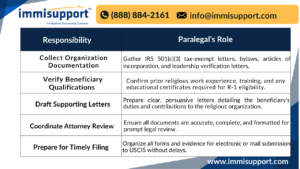
It was a typical Wednesday morning in Chicago. Attorneys John and Jan were reviewing an incoming R-1 Religious Worker petition. Piles of documents were scattered across the desk, and the clock was ticking for a timely USCIS filing.
A Conversation Between Two Top Attorneys: John and Jan
John:
“Jan, this R-1 petition looks straightforward, but the church’s documents are disorganized. If we don’t prepare this properly, USCIS might issue an RFE.”
Jan:
“You’re right. That’s why paralegals are essential—they handle the groundwork so we can focus on the legal strategy.”
John:
“Exactly, but how do they make the process efficient?”
Jan:
“They gather all required documentation, verify the beneficiary’s qualifications, draft support letters, and prepare everything for attorney review. It’s seamless when done right.”
Key Responsibilities of R-1 Religious Worker Petition Preparation in Chicago
Efficient petition preparation requires paralegals to handle multiple responsibilities. Below is a breakdown in an easy-to-read table format:

Benefits of Real-Time Paralegal Coordination
Real-time paralegal coordination enhances efficiency and accuracy in R-1 petition preparation. Key benefits include:
-
Faster Document Collection: Paralegals can quickly gather all organizational and beneficiary documents, reducing delays.
-
Improved Accuracy: Immediate verification and review minimize errors that could trigger RFEs.
-
Streamlined Attorney Review: Attorneys receive well-organized, complete petitions ready for filing.
-
Enhanced Communication: Real-time updates ensure attorneys are aware of any missing or pending documents.
-
Higher Approval Odds: Well-prepared, timely submissions improve the chances of USCIS approval.
Best Practices for Attorneys
-
Review Documentation Thoroughly: Confirm all documents are complete and meet USCIS requirements.
-
Provide Clear Instructions: Guide paralegals on expectations and specific legal requirements.
-
Maintain Open Communication: Stay updated on document collection and any challenges.
-
Stay Informed on USCIS Updates: Keep current with policy changes that may affect R-1 filings.
What Did We Learn?
-
Paralegals are critical for gathering, verifying, and organizing R-1 petition documents.
-
Real-time coordination enhances efficiency and reduces errors.
-
Timely filing and attorney oversight are essential for smooth petition processing.
What People Are Asking?
1. What are the key eligibility requirements for an R-1 visa?
The beneficiary must have at least two years of prior religious work and be coming to the U.S. to perform a religious role.
2. How do paralegals improve R-1 petition efficiency?
Paralegals manage documentation, draft support letters, verify qualifications, and organize materials for attorney review.
3. What challenges do attorneys face in preparing R-1 petitions?
Common challenges include incomplete documentation, verification of religious organization legitimacy, and ensuring compliance with USCIS requirements.
4. How does real-time coordination benefit attorneys?
It ensures immediate updates on document collection, reduces errors, and streamlines attorney review and filing.
5. What resources are available for attorneys handling R-1 petitions?
USCIS guidelines, consultation with experienced immigration professionals, and specialized document management systems.
Disclaimer:
For informational purposes only; not applicable to specific situations.
For tailored support and professional services,
please contact Immisupport, at +1 888 884 2161
Email: info@immisupport.com
Book a Demo: https://immisupport.com/demo/
Rated 4.9/5 by immigration attorneys. If you are looking for Outsourcing services for your Immigration practice, please email 📧info@immisupport.com or call 📞(888) 884-2161.
 Book a demo to build your team today
Book a demo to build your team today













 let’s talk - meet with Immigration Outsourcing expert
let’s talk - meet with Immigration Outsourcing expert